Parakeets, with their delightful chirps and vibrant colors, can bring joy and lively energy to any home. These intelligent, sociable birds are often a top choice among pet enthusiasts. However, owning a parakeet involves both a time and financial commitment. What can you expect to spend on parakeet prices, purchase costs, supplies, food, and more? The initial investment, ongoing costs, and the required care level can significantly influence the decision to bring one of these delightful birds into your home. This article offers a comprehensive look into the cost of owning a parakeet and what makes these charming birds such an enriching addition to a pet-friendly household.
Let’s explore parakeet prices, including their purchase cost, supplies, food, and more!
How Much Does a Parakeet Cost?
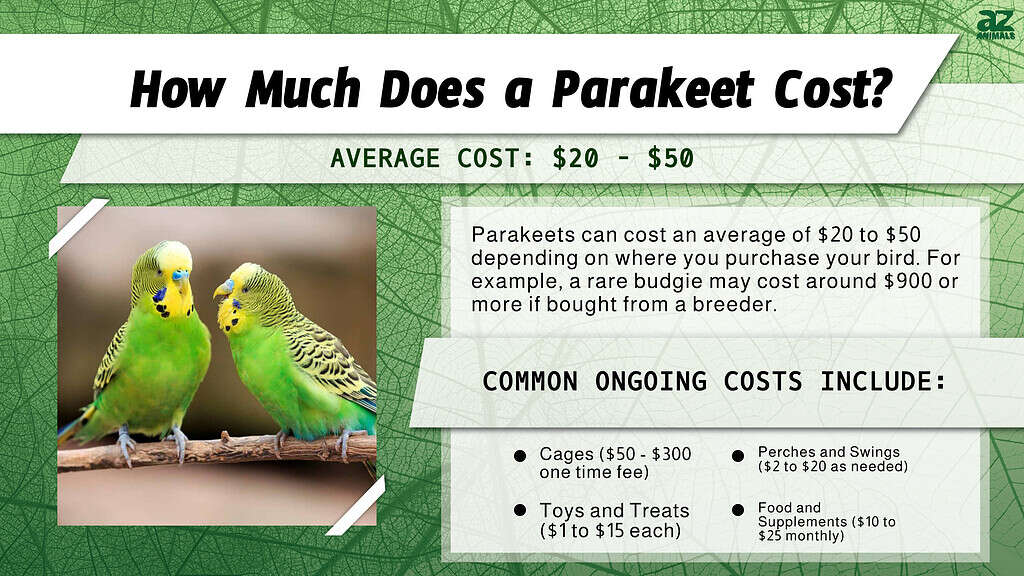
Parakeets, also known as budgies, are small, intelligent, and vibrant birds native to Australia. Their captivating personalities and stunning color variety make them popular pets worldwide. As prospective parakeet owners often wonder about the costs involved, we’re here to break it down, highlighting the difference in prices based on where you buy them and the breed.
Pet Store Chain Parakeet Cost
In a typical pet store chain, such as PetSmart or Petco, the average cost of a standard Budgerigar, the most common type of parakeet, is between $20 and $50. These are highly available and thus relatively inexpensive.
Independent Pet Store Parakeet Cost
Independent pet stores often provide a more comprehensive range of parakeet breeds, leading to a different pricing spectrum. These smaller, specialized shops often source their birds from dedicated breeders, ensuring quality and sometimes rarer species. Furthermore, the average cost at these stores typically ranges from $30 to $60 for common breeds, with exotic or less common breeds fetching higher prices.
Breeds of Parakeets and Adjacent Costs
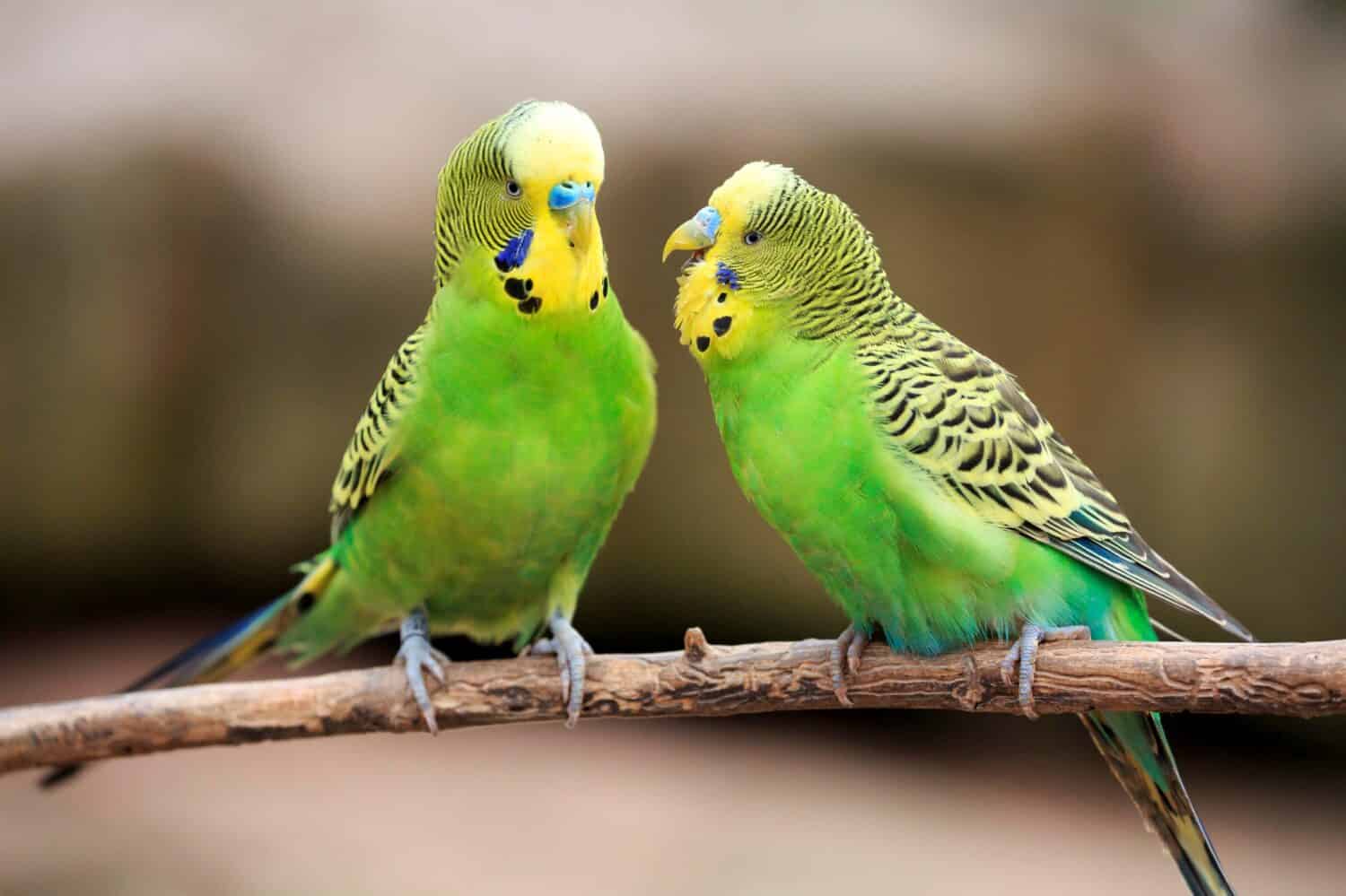
A Budgerigar is the most common type of parakeet.
©imageBROKER.com/Shutterstock.com
Diving into different breeds of parakeets, the common Budgerigar or ‘Budgie’ is the most readily available and thus the least expensive, generally ranging from $20 to $100, depending on the color variant and place of purchase. Known for their sociable nature and lively demeanor, Budgies come in various colors, including green, blue, yellow, violet, and white, each with unique pricing.
In contrast, the Rose-Faced Parakeet, known for its distinctive pink-hued face, falls within the higher pricing tier, often costing between $400 to $800. The captivating Indian Ring-Necked Parakeet, recognized by its vivid green plumage and distinguishing black and rose neck ring, can range from $400 to $700. Finally, Moustached Parakeets, famous for their namesake mustache-like facial marking, are considered rare, with prices ranging from $300 to $900.
Reputable Breeder Parakeet Cost
Buying a parakeet from a reputable breeder can significantly impact the price. Breeders often specialize in specific parakeet breeds, which means costs can fluctuate dramatically based on breed rarity, quality, and demand. It’s also worth noting that breeders tend to invest more time and resources into ensuring the health and well-being of the birds, which can lead to higher pricing.
Rescue Parakeet Cost
Animal shelters and rescue organizations also offer parakeets for adoption, with costs generally falling between $10 to $100. This price often covers administrative costs and, in some cases, may also include initial veterinary check-ups and vaccinations.
In summary, the cost of a parakeet varies widely based on where you purchase them and the breed you choose. Pet store chains offer budgies at an average cost of $20 to $50. In contrast, independent pet stores typically range from $30 to $60 for common breeds, with rarer breeds fetching higher prices. The price of various breeds of parakeets from breeders can range anywhere from $20 for a common budgie to $900 for rarer species like the Moustached Parakeet. Rescues and shelters provide another option, with prices between $10 to $100.
While parakeets are charming, entertaining, and relatively low-cost pets, it’s crucial to remember that their well-being goes beyond the initial purchase cost. Time, love, and attention are just as, if not more, important for these sociable and lively birds.
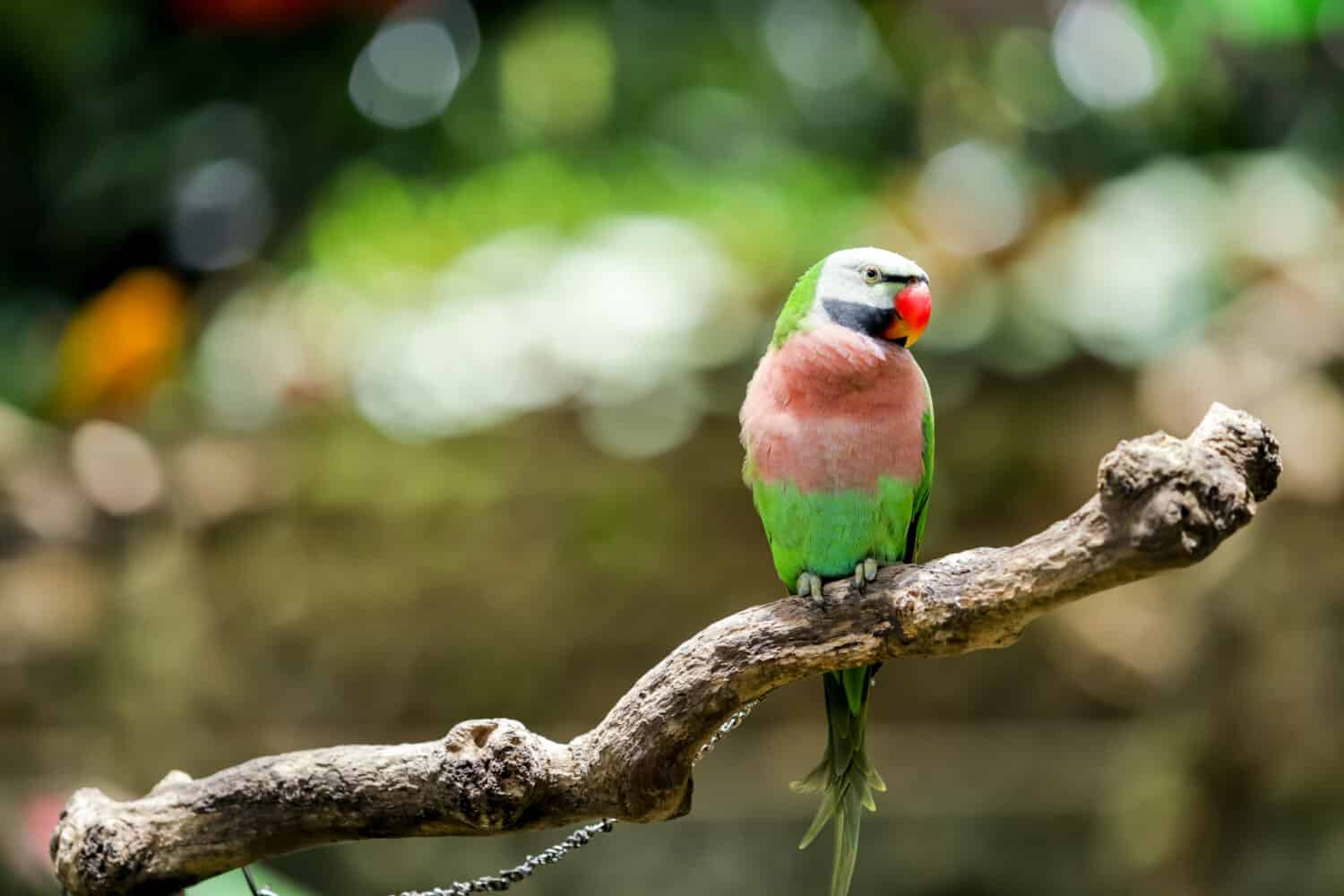
The Moustached Parakeet is a rare parakeet costing upwards of $900.
©Akhmad Dody Firmansyah/Shutterstock.com
Cost of Parakeet Supplies; Cage, Food, and More
A parakeet can make a wonderful and charming pet, but proper care for these lively birds involves a variety of necessary supplies and their associated costs. We will offer an in-depth look into all the essentials needed to provide your feathered friend with a comfortable and stimulating environment.
So, what can you expect to spend on parakeet prices, purchase costs, supplies, food, and more? Let’s find out.
Cages
First on the list is the cage. The cage is a parakeet’s home within your home, and it’s essential to ensure it’s spacious and safe. Parakeets are active birds that need room to fly, so a larger cage is always a good choice. The cage should be at least 24 inches long, 18 inches deep, and 18 inches high. However, this size is the bare minimum, and a larger cage should be a priority for the bird’s well-being. The average cost of a suitable parakeet cage varies from $50 to $300, depending on size and quality.
Perches and Swings
Next, your parakeet needs perches and swings. These offer areas for your bird to rest and provide much-needed exercise for their feet. Moreover, these range from $2 to $20 per item, based on the material and complexity of the design.
Toys and Treats
A variety of toys are a crucial part of a parakeet’s environment. They provide mental stimulation and prevent boredom. A range of toys that encourage various forms of play, such as ladders, bells, and mirrors, can cost anywhere from $1 to $15 each. Treats, such as millet sprays, are also important. Parakeets love millet, which makes for an excellent training aid or treat. A pack can cost around $5 to $10.
Food and Supplements
Healthy parakeets require a balanced diet, which includes a mix of seeds, pellets, fruits, vegetables, and even proteins from food like hard-boiled eggs. A month’s supply of parakeet food typically ranges from $10 to $25, while additional vitamin and mineral supplements can cost between $5 and $15.
Dishes
Food and water dishes are another necessity. Choose dishes that are easy to clean and refill. Depending on their size and material, these generally cost around $2 to $15 each.
Cuttlebones and Mineral Blocks
The need for cuttlebones and mineral blocks are essential for parakeets, providing necessary calcium and minerals and helping to keep their beaks sharp and healthy. As for cost, cuttlebones cost between $10 and $20, while mineral blocks cost between $2 and $5.
Cage Liners and Bedding
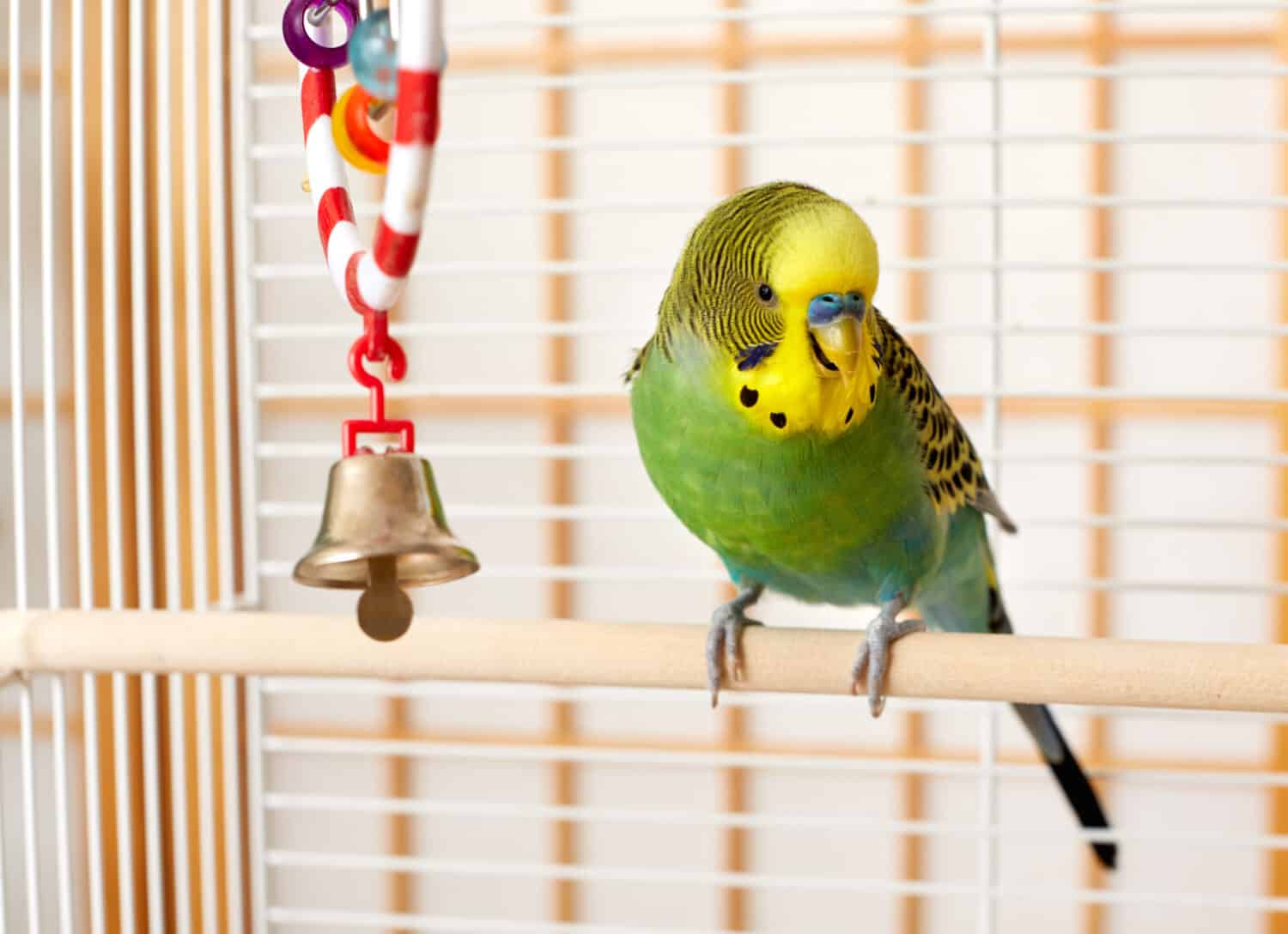
Parakeets require a comfortable and stimulating environment, including a large cage.
©kurhan/Shutterstock.com
Parakeets will need cage liners or bird-safe bedding. These supplies are necessary to maintain a clean living environment for your parakeet. On average, these cost around $5 to $20 per pack, with potential monthly expenses of $10 to $40 depending on the size of the cage.
Travel Carrier
Whether for vet visits or vacation travel, a bird-safe carrier is essential. The cost can range from $20 to $100.
Pet Insurance
An often overlooked aspect of parakeet care is insurance. Pet insurance can help cover veterinary costs in case of illness or injury. Parakeet insurance varies greatly depending on the coverage level but expect to pay between $10 to $60 per month.
First Aid Kit
Finally, it’s recommended to have a bird first aid kit on hand for any minor injuries or to stabilize your bird on the way to the vet. These kits can range from $20 to $60.
Average Initial Cost of Parakeet Supplies
Let’s explore the average cost of initial supplies needed for a parakeet. We will look at the costs of each supply item and find the average total cost of initial supplies needed for a parakeet. Prices can vary based on location, brand, and product quality.
Additionally, keep in mind that veterinary visits are inevitable. Though we do not have them factored into our cost projections below, it is wise to consider setting up a budget or savings to help cover costs whenever they arise.
List of Initial Parakeet Supplies
| Supply Item | Amount | Cost |
|---|---|---|
| Cage | Your parakeet will need one cage. | $50 to $300 |
| Perches and Swings | A parakeet needs anywhere from one to three swings and perches. | $6 to $60 |
| Toys and Treats | Parakeets need anywhere from one to five toys and one to five treat options. | $5 to $100 |
| Food and Supplements | You will need to purchase a food bag and potentially various supplements for your parakeet. | $10 to $40 |
| Dishes | Parakeets need at least two dishes, one for food and one for water. | $4 to $20 |
| Cuttlebones and Mineral Blocks | A parakeet requires a cuttlebone and mineral blocks. | $10 to $25 |
| Cage Liners or Bedding | Parakeets need a cage liner or bedding in their cage. | $10 to $40 |
| Travel Carrier | When you take your parakeet to the vet, you will need a carrier. | $20 to $100 |
| Pet Insurance | Having pet insurance can immensely aid in inevitable vet bills. | $10 to $60 |
| First Aid Kit | Having a first aid kit handy is always a good idea. | $20 to $60 |
On the low end, the total cost of initial supplies for a parakeet is roughly $165. This price accounts for the bare minimum of supplies, lacking enough toys, perches, swings, supplements, and treats to keep a happy and healthy parakeet.
Meanwhile, on the high end, the total cost of initial supplies for a parakeet is roughly $805. This price includes plentiful options of toys, perches, swings, supplements, treats, and premium options from each supply category.
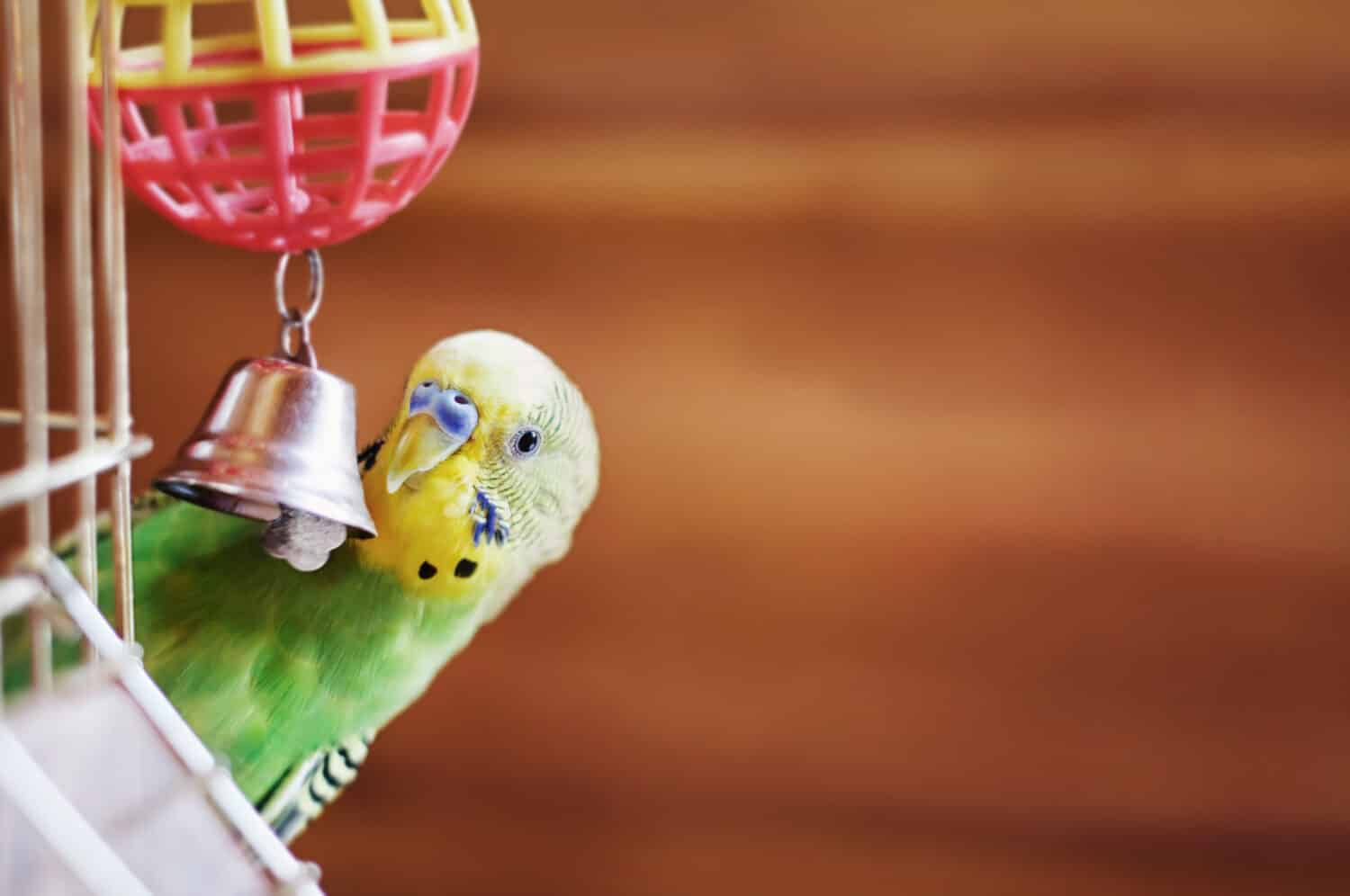
The parakeet is a playful and vocal bird.
©Vyaseleva Elena/Shutterstock.com
So, the average cost of initial supplies for a parakeet is roughly $485. This price includes middle-ground cost items and an ample selection of all necessary supplies, with enough toys, perches, swings, supplements, and treats to supply a well-cared-for parakeet.
Average Ongoing Cost per Month of Parakeet Supplies
Parakeet ownership involves continual investment in supplies to keep your bird healthy and happy. By understanding these costs upfront, you can ensure you provide the best care for your new feathered friend.
List of Ongoing Parakeet Supplies
| Supply Item | Purchase Frequency | Cost at Time of Purchase |
|---|---|---|
| Food and Supplements | Food and supplements are typically bought once every six months. | $10 to $40 |
| Resupply items such as toys, treats, swings, perches, or dishes. | Resupply items are typically bought once per month in quantities of one or more. | $0 to $30 |
| Cuttlebones and Mineral Blocks | Cuttlebones and mineral blocks are typically bought once per month. | $0 to $25 |
| Cage Liners or Bedding | Cage liners or bedding are typically bought once per month. | $10 to $40 |
| Pet Insurance | A monthly policy payment. | $10 to $60 |
On the low end of the ongoing monthly cost spectrum, the total cost of supplies for a parakeet is roughly $28.
Meanwhile, on the high end of the ongoing monthly cost spectrum, the total cost of supplies for a parakeet is roughly $124. This price reflects high-cost insurance, which isn’t common, generous spending on resupply items such as toys and treats, as well as premium options from each supply category.
The average cost of ongoing monthly supplies for a parakeet is roughly $75.
Finally, each cost within the spectrum reflects the average cost per month of supply items purchased monthly in addition to the average monthly price of supply items purchased once every three to six months. Please note that prices can vary based on location, brand, and product quality.
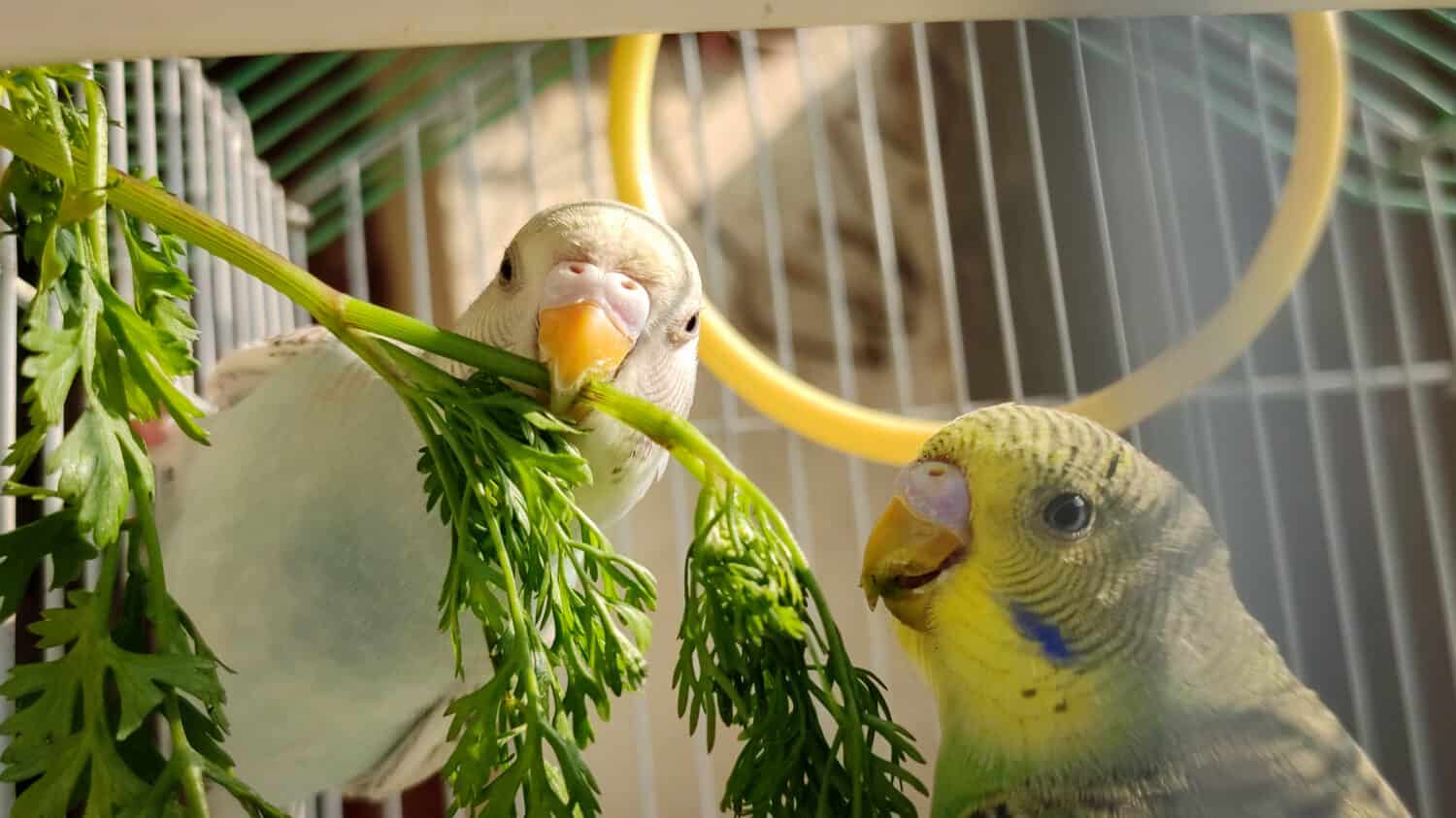
The colorful parakeet requires a nutritious diet consisting of a mix of seeds, pellets, fruits, vegetables, and even proteins from food like hard-boiled eggs.
©RJ shots/Shutterstock.com
Do Parakeets Make Good Pets?
Parakeets are one of the most popular pet birds worldwide. Their vibrant colors, sociability, and intellectual capacity draw many prospective pet owners to them. But do parakeets make good pets for everyone? The answer lies in understanding their unique personalities, lifespans, and maintenance requirements.
Parakeets Have Big Personalities
With a personality that’s as bright as their feathers, parakeets are spirited, intelligent, and sociable. These lively birds are known for their inquisitive nature and capacity to form strong bonds with their human caretakers. They’re chatty birds, who enjoy whistling and singing and, with proper training, can even mimic human speech. Some can even learn parts of songs or phrases.
Moreover, their engaging personalities and zest for interaction mean parakeets can be a fantastic choice for individuals or families seeking a communicative and interactive pet. They’re also generally good with children, as long as the child is taught how to handle and care for the bird gently. However, a parakeet might not be the best choice for those who prefer a quiet or low-activity pet, given their energetic disposition and vocal nature.
Parakeets Live Up to 10 to 15 Years
Parakeets can live up to 10 to 15 years in captivity, with some well-cared-for budgies even reaching their early twenties. This lifespan means that owning a parakeet is a long-term commitment and not a lightly made decision. Furthermore, prospective owners should prepare to provide a lifetime of care, which includes daily interaction and stimulation for their feathery friend.
Parakeets Are Both Low and High Maintenace
When considering the maintenance requirements of parakeets, it’s essential to understand that these birds require a fair amount of care. While not high maintenance in the same sense as some larger pets, their needs go beyond simple food and water. Parakeets require a varied diet that includes seeds, fruits, vegetables, and occasionally, protein in the form of hard-boiled eggs or cooked chicken. They also need clean, spacious cages with various toys for mental stimulation. Moreover, their sociability means they require regular, daily interaction and socialization. Neglecting these needs can lead to boredom, depression, or health issues in parakeets.
Additionally, parakeets are sensitive to their environment. They thrive in stable conditions and can become stressed by drastic temperature changes or loud noises. This sensitivity means parakeets require a consistently safe, calm, and comfortable environment.
Parakeets also need regular baths or misting to keep their plumage in top shape. Plus, their beaks and nails require occasional trimming, which a vet or experienced bird handler should do to prevent injury.
Moreover, parakeets can make great pets for the right people and families. Their interactive nature, bright personalities, and intellectual capacity can provide joy and companionship. However, they require a certain level of commitment, from providing a varied diet and a stimulating environment to ensuring consistent social interaction. They’re not ideally suited to all individuals or households, particularly those unable to invest the time and resources necessary for their care. But for those who can, the reward of a parakeet’s companionship can be truly enriching.

Parakeets can make wonderful pets.
©Lordn/Shutterstock.com
Conclusion
Parakeets, known for their vibrant personalities and intellectual capabilities, can be a delightful addition to a family or individual’s life. Furthermore, they offer a lively and interactive pet experience, often forming strong bonds with their human caretakers. However, their charming qualities come with certain cost considerations and care commitments.
On average, the cost of a parakeet varies based on factors like the breed and where you purchase from, with the average price of roughly $50, with prices ranging from $10 to $100. In comparison, rarer breeds of parakeets can cost anywhere from $300 to $900.
In addition, the initial investment in a parakeet involves more than just the bird. Prospective parakeet owners should prepare to spend around $485 on supplies. This initial expense includes a spacious and safe cage, a variety of toys for mental stimulation, perches and swings for their physical activity, as well as essential items such as food and water dishes, cuttlebones, and mineral blocks.
But the expenses do not end there. Moreover, owning a parakeet involves ongoing costs to ensure their health and well-being. A budget of about $75 per month is to be expected for ongoing expenses such as food, supplements, cage liners or bedding, and pet insurance.
Parakeets Can Make Excellent Pets
Parakeets make excellent pets for those who appreciate their energetic and vocal nature. They thrive in households that can provide them with daily interaction, a varied diet, and a stimulating environment. Furthermore, they’re particularly suitable for individuals and families willing and able to commit to their long-term care, given their lifespan of up to 15 years or longer.
In conclusion, while parakeets do require a certain level of financial commitment and consistent care, the joy and companionship they provide can be an enriching addition to a pet-friendly household. Finally, their engaging nature and bright personalities offer an interactive and rewarding pet experience, making them a popular choice among bird lovers.
The photo featured at the top of this post is ©
Thank you for reading! Have some feedback for us? Contact the AZ Animals editorial team.






